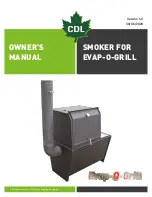
26
-
Always carefully wash all plates and utensils used to handle raw food before using them to handle
cooked food.
-
Always wash all vegetables, seafood and poultry before cooking.
-
Always leave uncooked foods in the refrigerator until you are ready to start cooking.
-
Always marinate meat in the refrigerator. Dispose of the excess marinade, and never reuse it.
-
Always preheat your Grill for 5 to 10 minutes before cooking, and clean off all grease and food
residue before using the cooking grids.
Grilling Tips:
-
If you pre-cook meat or poultry, do so immediately before grilling.
-
Never defrost meat at room temperature or on a countertop.
-
Refrigerate leftovers within 2 hours of taking food off the grill.
-
Never let the grease tray boil dry. That could be hazardous, as grease from fatty foods that have
collected in the tray could ignite and possibly cause bodily injury or property damage.
-
Use a meat thermometer to be sure food has reached a safe internal temperature.
-
Always trim excess fat from your foods to reduce the occurrence of flare-ups during cooking.
-
Apply a light coating of cooking oil to the cooking grids before grilling to prevent foods from sticking.
-
Cook similar portion sizes together, so that they all cook evenly.
-
Use tongs to turn foods on the Grill.
-
Never pierce foods while they are cooking on the Grill, as this will dry them out.
-
Turn foods infrequently. Some chefs say that a good steak should never be turned more than once.
-
Apply sugar-based sauces such as commercial barbecue sauces only during the latter stages of
cooking, to prevent charring.
-
Soak the string you use to tie up roasts and poultry on the Rotisserie spit to protect it from burning.
-
Use a disposable aluminum tray filled with water, fruit juice, wine or a marinade to add extra flavor
and moisture to slow-cooked foods like roasts, whole chickens, turkeys or ducks.
-
The US Department of Agriculture recommends the
minimum
temperature be reached for
the following food items:
Chops ..................................... 145 degrees F (62.8° C)
Ground Meat .......................... 160 degrees F (71° C)
Pork ........................................ 160 degrees F (71° C)
Poultry ................................... 180 degrees F (82° C)
Roasts .................................... 145 degrees F (62.8° C)
Seafood .................................. 140 degrees F (60° C)
Vegetables ............................. 145 degrees F (62.8° C)
Controlling Flare-ups
Flare-ups are a part of cooking meats on a gas grill. This adds to the unique flavor of cooking on a gas
grill. Excessive flare-ups resulting from the build-up of grease in the bottom of the grill can over-cook the
food and cause a dangerous situation for you and your grill. If this should occur, DO NOT pour water
onto the flames, which can cause the grease to splatter and could result in serious burns or bodily harm.
If grease fire occurs, close the hood and turn off the main burners until the grease burns out. Use caution
when opening the hood as sudden flare-ups may occur.
Summary of Contents for FLO-3BL
Page 14: ...14 FLO 3BL LP FLO 3BL NG Parts List...
Page 16: ...16 FLO 3BR LP FLO 3BR NG...
Page 17: ...17 FLO 4BL LP FLO 4BL NG...
Page 19: ...19 FLO 4BR LP FLO 4BR NG...
Page 20: ...20 FLO5BR LP FLO 5BR NG...







































